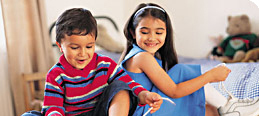Child Bedwetting

By Alana Gold, Registered Dietitian
Does your child wet the bed? If so, they are not alone. About five to seven million children wet the bed, with occurrences more common among boys than girls. Truestar is here to give you all the information you need to help your children cope with this problem with ease.
Causes of Bedwetting
Enuresis is the medical term for wetting the bed during sleep. There are many causes, some of which include: genetic factors (if one parent wet the bed, the childs chance of bedwetting is 25%; if both parents wet the bed, their childs risk is 65%), deep sleep, slower than normal development of the central nervous system, hormonal factors, urinary tract infections, abnormalities in the urethral valves in boys and in the ureter in girls or boys, abnormalities in the spinal cord and inability to hold urine for a long time due to a small bladder.
Achieving Bladder Control
Children achieve bladder control at different ages. However, by age five most children will no longer wet the bed. Statistics show that at age five, 15% of all children wet the bed. Even without any treatment, the number is reduced to 2% by age 15.
Here are some tips you can try to help your child increase the number of dry nights:
Let your child know that what is happening is normal at this age and its not his or her fault. Be sure not to punish or blame your child for wetting the bed and make sure that other family members do not tease or poke fun at them.
Two hours before bedtime avoid giving your child large amounts of fluids.
Before your child goes to bed, have them go to the bathroom.
Let your child help change the wet sheets.
Try an awakening routine, in which you wake your child to urinate two to three hours after they go to bed.
Try behavioral treatments such as using an alarm system that rings when the bed is wet and teaches the child to respond to bladder sensations at night, a reward system for dry nights, bladder training such as having your child holding his or her urine for longer and longer times.
Medicines are available that may or may not be suitable for your child. Speak to your health care provider.
Bottom line: Bedwetting isnt your childs fault and they should not be made to feel guilty or embarrassed. Be patient as the problem will likely resolve on its own as the child gets older. Speak to your health care provider for any concerns you may have.
www.truestarhealth.com
Does your child wet the bed? If so, they are not alone. About five to seven million children wet the bed, with occurrences more common among boys than girls. Truestar is here to give you all the information you need to help your children cope with this problem with ease.
Causes of Bedwetting
Enuresis is the medical term for wetting the bed during sleep. There are many causes, some of which include: genetic factors (if one parent wet the bed, the childs chance of bedwetting is 25%; if both parents wet the bed, their childs risk is 65%), deep sleep, slower than normal development of the central nervous system, hormonal factors, urinary tract infections, abnormalities in the urethral valves in boys and in the ureter in girls or boys, abnormalities in the spinal cord and inability to hold urine for a long time due to a small bladder.
Achieving Bladder Control
Children achieve bladder control at different ages. However, by age five most children will no longer wet the bed. Statistics show that at age five, 15% of all children wet the bed. Even without any treatment, the number is reduced to 2% by age 15.
Here are some tips you can try to help your child increase the number of dry nights:
Bottom line: Bedwetting isnt your childs fault and they should not be made to feel guilty or embarrassed. Be patient as the problem will likely resolve on its own as the child gets older. Speak to your health care provider for any concerns you may have.
www.truestarhealth.com
MORE



